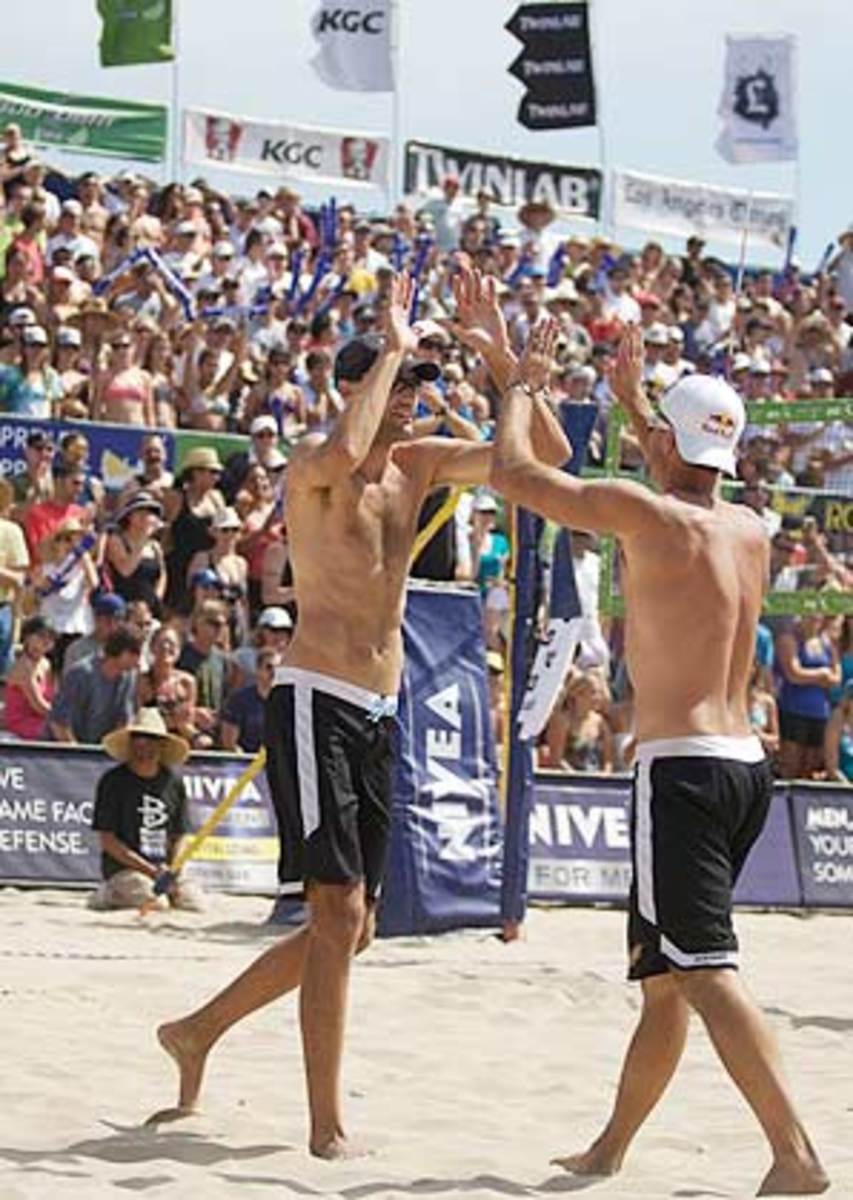
American beach volleyball winning streak ends; more Olympic notes
American sand kings Phil Dalhausser and Todd Rogers suffered their first FIVB beach volleyball defeat in 10 months at the Prague Open on Sunday. The pair fell to Brazilians Emanuel Rego and Alison Cerutti, who ousted the 2008 Olympic champions 21-19, 21-14 in the gold-medal match.
The loss snapped Dalhausser's and Rogers' 40-match winning streak, which dated to a forfeit last July in a group-play match in a tournament they went on to win. They had not been beaten outright since fellow Americans Jake Gibb and Sean Rosenthal topped them 45 matches ago.
The Brazilian game plan threw Dalhausser and Rogers off guard. Most teams elect to serve to the 6-foot-2 Rogers to take away the dominating spiking game of the 6-9 Dalhausser. Rego and Cerutti did the opposite, living dangerously by serving to Dalhausser, nicknamed "The Thin Beast" for his prowess. It worked.
"Neither of us were prepared for that because they've never done that before," Rogers said. "They switched up a lot of things on us."
Dalhausser and Rogers, the top-ranked men's team in the world, had won nine straight tournaments on the FIVB Tour. Their 40-match streak is an FIVB men's record but fell far short of the women's mark set by Misty May-Treanor and Kerri Walsh. They won 74 straight.
Dalhausser and Rogers began playing regularly on the international FIVB Tour the last two years due to the financial difficulties and eventual demise of the domestic AVP Tour in 2010. "We're playing pretty much exclusively FIVB now," Rogers said. "You don't have any gimmes. On the AVP, there were some times we didn't have to play that strongly and felt pretty comfortable."
Better competition is not the only rigor of the international tour.
"There's a lot more travel than I prefer to do," said Rogers, who lives in California with his wife and children. "The fact that we're away from home and family, not having that security that you have with an event [in the U.S.]. Not being on American TV, it hurts a little bit. It potentially hurts for sponsors."
The next major event for Dalhausser and Rogers is June's world championships in Rome. They won the 2007 world championship and settled for bronze in 2009.
*****
In his confession to CBS' 60 Minutes, cyclist Tyler Hamilton said of his 2004 Olympic gold medal, "I don't even like to look at the gold medal anymore because it makes me sad."
After his interview with CBS (but before it aired), Hamilton voluntarily gave his gold medal to the U.S. Anti-Doping Agency. Hamilton actually failed a test for blood doping at the Olympics but kept the medal because his "B" sample was damaged.
The International Olympic Committee has not yet stripped Hamilton of the medal, but if it does, Russia's Viatcheslav Ekimov could get bumped up to gold, American Bobby Julich to silver and Australian Michael Rogers to bronze.
Ekimov and Julich were, at one point in their careers, teammates of Lance Armstrong. Ekimov backed Armstrong's defense against doping claims last week.
This isn't the first time an athlete gave up an Olympic medal on his own. Marion Jones and the late Antonio Pettigrew lost theirs due to doping, but clean sprinter Shawn Crawford gave his 2008 200-meter silver medal to Churandy Martina of the Netherlands Antilles in a bizarre hotel episode.
*****
For the first time since 1992, Australia's biggest Olympic trials event won't take place in Sydney. Adelaide was recently selected to host the 2012 Australian Swimming championships March 15-22, four months before the London Olympics.
Not everybody was thrilled about the new host city.
"Olympic trials 2012 in Adelaide. What an absolute joke!" Australian 100 freestyle champion James Magnussen posted on his Facebook page, according to the Adelaide Advertiser. "Can't wait to swim in front of crowd of 10 and that will only happen if the entire city turns out to watch."
More than 1 million people live in Adelaide, Australia's fifth-largest city. Magnussen, 20, later apologized.
The list of Aussie swimmers coming out of retirement and bidding for London includes multiple Olympic medalists Ian Thorpe, Libby Trickett, Michael Klim and Geoff Huegill.
It might very well be the last swim for some or all. Australia's depth rivals the U.S., and only two Olympic berths are available per individual event.
Six-time Olympic medalist Trickett, 26, makes her return to the pool this June in a swim-off to determine the final spot on the 400 freestyle relay team for the world championships, July 24-31 in Shanghai.
Huegill, 32, will swim at worlds, while Thorpe and Klim aren't eligible for competition until later this year.
*****
Suspended Olympic 400 champion LaShawn Merritt appealed to USA Track & Field to participate in this summer's world championships, according to the Chicago Tribune.
Merritt's case is curious. As reigning world champion, he would normally receive an exemption into this year's worlds. The only stipulation is that he merely show up and compete at the U.S. championships in June to confirm his spot. Therein lies the problem.
Merritt's 21-month suspension for testing positive for a steroid found in ExtenZe runs through nationals but ends before worlds.
A USA Track & Field spokesperson said Merritt's fate will be decided after the U.S. championships.
*****
U.S. figure skater Rachael Flatt may have TV anchoring to fall back on in the unlikely event her chemical engineering studies at Stanford don't pan out.
Flatt won a "Celebrity Sports Apprentice" competition at a Colorado news station, beating out three others, including Air Force football coach Troy Calhoun. You can watch her sports report here.





